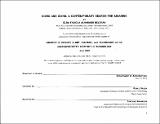| dc.contributor.advisor | Renee Green. | en_US |
| dc.contributor.author | Alvarado Beltrán, Elba Fabiola | en_US |
| dc.contributor.other | Massachusetts Institute of Technology. Dept. of Architecture. | en_US |
| dc.date.accessioned | 2012-09-13T18:52:50Z | |
| dc.date.available | 2012-09-13T18:52:50Z | |
| dc.date.copyright | 2012 | en_US |
| dc.date.issued | 2012 | en_US |
| dc.identifier.uri | http://hdl.handle.net/1721.1/72809 | |
| dc.description | Thesis (S.M. in Art, Culture and Technology)--Massachusetts Institute of Technology, Dept. of Architecture, 2012. | en_US |
| dc.description | Cataloged from PDF version of thesis. | en_US |
| dc.description | Includes bibliographical references (p. 111-118). | en_US |
| dc.description.abstract | Meaning provides the individual with a sense of a purpose to live, being himself, and feeling at ease. Finding meaning on a daily basis is paramount. Yet, the search is constant since meaning is lost and regained persistently. Humans strive to find it, especially in the XXIst century. The high demands of productivity, and the repetitions or monotony of everyday living can cause this loss of meaning. Moreover, the accelerated pace of time and the overwhelming amount of information produced by telecommunication and computer technologies cause the loss, too. Considering the above problems, the questions they pose are: How and where to find meaning? Where can the technologized individual find a dose of it? This thesis aims to present the resolution of these questions through the chronological and epistemological trajectory of my own search for meaning. Also, this thesis presents a variety of cases in which the loss of, the search for, and the discovery of meaning happen in the context of contemporary life. Tracing the path for the meaningfulness of my art practice through the understanding of boredom, and my fascination of video games, as a medium, drove this work. My exploration towards meaning generated an intuitive, and subjective methodology that blended artistic and scientific methods (phenomenological, ethnographic, philosophical, psychological, analytical...) that rendered an unconventional series of sequential findings. These discoveries show that the search for meaning has the form of a mental journey or vacation to the worlds of the self. For example, daydreaming and dreaming are natural means to go on an excursion to our inner lands. In the modern world, meaningful mental expeditions can come about when learning or perfecting skills for play or sports, with the body or with the aid of technological tools (meaning is in action not in production). This work explains how driving real or virtual race cars transport drivers to inner locations where they spend quality time with themselves. I argue that these mediums perform as vehicles of self-exploration and self-reflection that bring about self-knowledge. Consequently, racing's particularity offers the experience of speed, which sets the conditions for the optimal mental state to find the self. This state provides a sense of time, freedom, and oneness that suspends the individual temporarily from mundane contemporary life: he finds himself in a dream with the eyes wide open and clear mind. | en_US |
| dc.description.statementofresponsibility | by Elba Fabiola Alvarado Beltran. | en_US |
| dc.format.extent | 118 p. | en_US |
| dc.language.iso | eng | en_US |
| dc.publisher | Massachusetts Institute of Technology | en_US |
| dc.rights | M.I.T. theses are protected by
copyright. They may be viewed from this source for any purpose, but
reproduction or distribution in any format is prohibited without written
permission. See provided URL for inquiries about permission. | en_US |
| dc.rights.uri | http://dspace.mit.edu/handle/1721.1/7582 | en_US |
| dc.subject | Architecture. | en_US |
| dc.title | Going and going : a contemporary search for meaning | en_US |
| dc.type | Thesis | en_US |
| dc.description.degree | S.M.in Art, Culture and Technology | en_US |
| dc.contributor.department | Massachusetts Institute of Technology. Department of Architecture | |
| dc.identifier.oclc | 806309177 | en_US |
